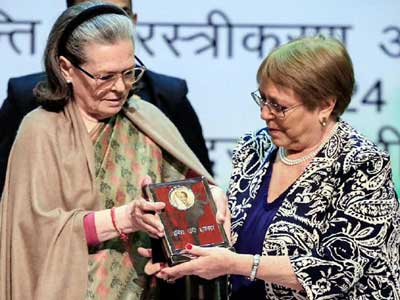Have India’s national honours been reduced to a geopolitical wink and nod? The Congress Party’s decision to confer its prestigious Indira Gandhi Prize for Peace, Disarmament and Development on Michelle Bachelet, a figure whose tenure as UN Human Rights Chief repeatedly cast India in a suspicious light, has ignited a storm that refuses to die down. What should have been a dignified ceremony has turned into a pointed political statement, raising a blunt question: Is the Congress now comfortable validating voices that consistently challenge India on global platforms?
The significance of this award goes far beyond trophies, speeches, or ceremonial niceties. When Sonia Gandhi presented Bachelet with the 2024 prize on November 19, the symbolism was unmistakable. Critics, including the BJP, immediately argued that the Congress was endorsing an ‘anti-India mindset’. At a moment when national unity and strategic clarity are paramount, the party’s choice seems almost tailor-made to trigger doubts about its own political bearings.
Bachelet’s track record is no secret. As UN Human Rights Commissioner, from 2018 to 2022, she routinely internationalised India’s domestic issues, especially Kashmir. Her expressions of “deep concern” after the abrogation of Article 370 echoed, sometimes eerily, the vocabulary used by Pakistan and the OIC. While her office displayed conspicuous urgency in commenting on India, it maintained near-total silence on Pakistan-backed terrorism, the plight of Kashmiri Pandits, and cross-border violence that continues to destabilise the region. Many in India saw a pattern: a willingness to scrutinise India, and a reluctance to acknowledge the forces that threaten it.
Public commentator Prof Paras Nath Chaudhary notes, “It wasn’t just Kashmir. Whether it was democracy, minority rights, NGOs, civil liberties or the farm laws protests, Bachelet’s criticisms appeared firmly rooted in the global left-liberal narrative that portrays India as perpetually on the brink. Casting doubt on India’s institutions became a routine feature of her tenure.”
Against this backdrop, the Congress’s decision to honour her cannot be dismissed as an academic or cultural gesture. It is a political signal, deliberate, ideological, and international. At a time when India is shaping a more self-assured global posture, the Congress seems intent on validating those who highlight the country’s vulnerabilities while overlooking its threats.
Viewed alongside Rahul Gandhi’s overseas remarks, his repeated warnings that “Indian democracy is in danger,” his scepticism over the Balakot airstrike, and his tendency to critique India before foreign audiences, the Bachelet award appears less like an independent selection and more like an extension of the same political grammar.
This is where the Indira Gandhi Peace Prize itself enters a grey zone. Once an award associated with leaders, thinkers, and institutions that strengthened India’s security, diplomacy, and development, it now risks becoming a platform for amplifying voices that see India through a consistently adversarial lens. Is the Congress signalling its own discomfort with the idea of a confident, assertive India? Or is this simply a reflection of an internal ideological drift?
Much of this confusion can be traced to the Congress’s intellectual ecosystem, its so-called think-tank. Over the years, this inner circle has increasingly appeared detached from ground sentiment, entrapped in echo chambers far removed from India’s political and civilizational pulse. This is the same advisory group that crafted the polarising strategies around “Bharat Jodo”, that urged public questioning of military operations, and that continues to shape Congress’s attempts to engage international critics as ideological allies.
The result is a party that seems to think in borrowed idioms, respond with reflex instead of strategy, and prioritise rivalry over national consensus. Honouring Bachelet is only the latest marker of a disconnect that grows wider with each passing year.
In the end, this award is not just about Michelle Bachelet. It is a mirror, reflecting a Congress Party unsure of its ideological footing, increasingly reliant on global narratives rather than national ones, and strangely at ease with voices that underplay India’s challenges while amplifying its flaws.
Whether this is strategic repositioning or simple political misjudgment, the implications are unmistakable: the Indira Gandhi Prize, once a symbol of Indian resolve and statesmanship, now stands at a crossroads, and so does the Congress that bestowed it.
















Related Items
India’s ‘Unique’ Journey as a Republic…
India rises as a ‘Global Medical Travel Destination’
A social revolution India has been waiting for…